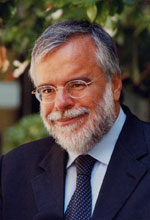
Mr. President,
Mrs. Chancellor
Eminent religious leaders,
Our world has changed over few years. The nuclear threat, sad companion of the cold war, ended thirty years ago, following the treaty over the Euromissiles. The Berlin wall fell down. The process of globalisation has brought melting of peoples, fast communication, and a vast market. Consolidated hegemonies have disappeared to open to a new global era. However, something went missing. A spiritual unification was needed to be build, next to the global economy giant. The spiritual worlds have frequently remained confined within their traditional horizons. Often, religions have not grasped how globalisation is an adventure for both spirit and faith.
Fear has spread instead. Old fears have emerged fuelled by the immense global landscape, and dreaded invasions. Peoples demands reassurance, and they find it in the loud rhetoric of the clashing or in aggressive leaders. The identification of an enemy gives reassurance. New walls rise for fear of the other. This is the current contradiction: a unified world yet so divided. Division as a reaction to unification.
As I mentioned, a spiritual unification of the contemporary world went missing. A spiritual unification does not mean uniformity or homologation. Rather a profound and great movement of spiritual and interreligious dialogue turning people into friends, even if different: both on the local and on the worldwide horizon.
Often, globalisation has been established with no soul, based on the leading materialistic mentality of economy. In this scenario, we have taken – I am talking as the Community of Sant’Egidio, since 1968 when John Paul II invited religions to pray in Assisi… we took the responsibility to continue the dialogue among religions. We did it with no power, but with the tenacity not to lose touch with any world. Every year we have been walking along this path with many of those present here: Card. Martini, the Rabbi Sirat, the Venerable Yamada, Prof. Bauman, Ghassan Tueni. Also, with many we hope to meet again: the Bishops of Aleppo Mar Gregorios Ibrahim and Paul Yazigi, kidnapped in Syria four year ago supposedly during a peace mission.
Spiritual streams change history. A phenomenon as evident as it is forgotten. A clear example: the Protestant Reformation, five hundred years ago. One world has changed, only starting from the Scripture, due to a different approach to the Bible. We are here, in Germany, to bring homage to a spiritual event that has impacted on conscience and touched the opponents, leading them to reform themselves. A German spiritual story has become European and global.
Though, the limitless giant of globalisation needs a soul. The soul grows in the dialogue among spirits, in friendship and in prayer. Dialogue is the essential structure of many religions: the dialogue with God, prayer; the dialogue with the sacred scriptures, among spiritual representatives. Religions are living creatures. Unlike ideologies, they are rooted in the ground, close to sorrow, to joy, to people’s sweat, they are able to welcome their breath. I have witnessed many desperate people praying in places of sorrow or along the terrible travelling routes of displaced populations.
Religions do not verticalize as many institutional processes do, rather they stay in touch to land, among the houses: the synagogue, the church, the mosque, the temple, and other sacred places. This is why, the means to humiliate any people are violence on women and destruction of sacred places.
Today, even if millions of different people got closer and live together, they remain estranged. Paths of peace are needed to be built through dialogue within people: helping different people live together. A path of peace (I can’t go into more details on the concept here) means being coordinated in the fight against poverty: I think about Africa and I take the opportunity to greet the President of Niger. Africa will be a great part of the future of humanity, not only demographically. Cooperation with African countries is vital to support development with justice from the North of the world, and justice from African political leaders. Religions have a common vision over humanity and remind there is no safe future for some if others are neglected, for the rich among many poor.
The hatred makers have understood the usefulness of religions by using them to fuel the culture of the enemy and terrorism. Religions can act as water to extinguish the fire of violence, as well as fuel that propels it. Terroristic ideologies are a terrible instrument held in the hand of those who are violent, able to carry great sorrow, although they will never win. How crucial then is the religious leaders’ role in enlightening minds! The Great Imam of Al Azhar, Al Tayyb, has well clarified that in Islamic terrorism, religion has been kidnapped by those who have no right to speak in its name.
According to religions, violence and war are not holy. Peace only is holy. To make it happen, there is need to daily craft it by opening routes, by connecting everyone into a fabric of dialogue and cooperation. Never by isolating. Men and women of faith have the patience to carry this duty up to the remote places on earth. They are bound to leave the structures of the past and to believe the treasures of their religions can establish peace. Often, war starts from egocentrism and egoism. Every believer can be a peacemaker. Muhamad Iqbal, great Muslim poet of the Indian continent, wrote: ‘Have the audacity to grow, dare! O man of God! It is not narrow the Kingdom of heaven!’. Today, the space to build peace is not narrow, but more audacity is needed! This is why we are gathered here again.
